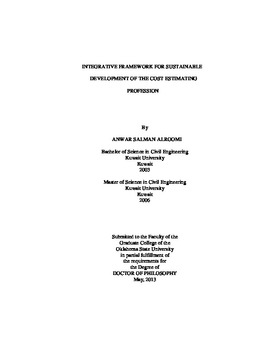| dc.contributor.advisor | Jeong, Hyung Seok "David" | |
| dc.contributor.author | Alroomi, Anwar Salman | |
| dc.date.accessioned | 2014-09-24T14:16:25Z | |
| dc.date.available | 2014-09-24T14:16:25Z | |
| dc.date.issued | 2013-05 | |
| dc.identifier.uri | https://hdl.handle.net/11244/10954 | |
| dc.description.abstract | The main purpose of this study is to develop an integrative learning framework for the estimating profession that will help companies in the construction industry adapt healthier environment and management practices to retain experienced estimators' knowledge and skills. This multi-dimensional framework considers the effect of learning environment and motivation (intrinsic and extrinsic) practices on the retention practices and development of the estimating competencies. To develop effective framework, two phases methodology was adapted. | |
| dc.description.abstract | In the first phase, 23 core estimating competencies were identified and classified into skills, knowledge, and personal attributes and also quantified the degree by which new estimators lack each competency. A criticality matrix was developed to prioritize estimating competencies based on the combined effects of the level of importance of each competency and its associated gap between the ideal and actual level of competency. The factor analysis method was applied to investigate the correlation effects of the 23 estimating competencies and resulted in seven core estimating competency factors representing the core estimating competencies. | |
| dc.description.abstract | The second phase assessed the effectiveness of ten traditional and advanced capture and transfer methods in retaining and developing each of the seven core estimating competency factors. Also, this phase assessed the current level of development of the learning environment, and intrinsic and extrinsic motivations practices and their effects on the improvement of estimators' capabilities. The Structural Equation Modeling (SEM) method was employed to assess the effectiveness of each of the capture and transfer methods, and evaluates the effect of the leaning environment and motivations on the development of the estimators' capabilities by analyzing the embedded correlations between variables. As a result, capture and transfer models for the cost estimating profession was developed showing the effective methods to retain each of the estimating competency factors. Furthermore, the integrative framework result emphasized the significant effects of the learning environment and motivation practices on sustaining the development and retention of the cost estimating competencies. | |
| dc.description.abstract | The findings of this study can help companies in the construction industry assess their estimators' capabilities and design appropriate training programs for their estimators based on their specific needs. Also, the findings will significantly improve companies' practices in retaining estimators' knowledge and skills, and help companies adapting a healthy learning environment that facilitate learning and sustain knowledge transfer. | |
| dc.format | application/pdf | |
| dc.language | en_US | |
| dc.rights | Copyright is held by the author who has granted the Oklahoma State University Library the non-exclusive right to share this material in its institutional repository. Contact Digital Library Services at lib-dls@okstate.edu or 405-744-9161 for the permission policy on the use, reproduction or distribution of this material. | |
| dc.title | Integrative framework for sustainable development of the cost estimating profession | |
| dc.contributor.committeeMember | Oberlender, Garold D. | |
| dc.contributor.committeeMember | Chong, Oswald W. K. | |
| dc.contributor.committeeMember | Hobson, Dana | |
| osu.filename | Alroomi_okstate_0664D_12764.pdf | |
| osu.accesstype | Open Access | |
| dc.type.genre | Dissertation | |
| dc.type.material | Text | |
| thesis.degree.discipline | Civil and Environmental Engineering | |
| thesis.degree.grantor | Oklahoma State University | |
